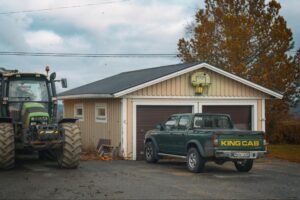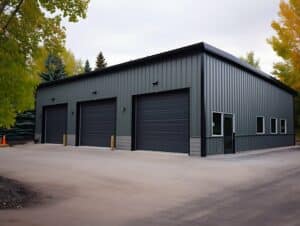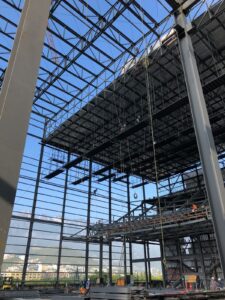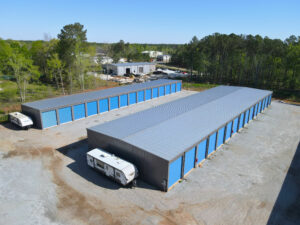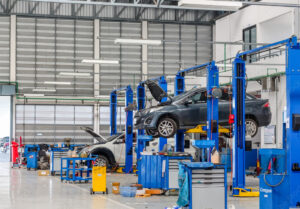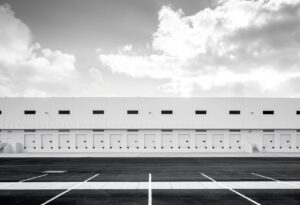In the world of agriculture, having a reliable storage solution for your farm equipment is essential. A farm equipment storage shed and available types, provide a secure and convenient space to protect your valuable tools, and machinery from the elements.
The Sheds and Outdoor Storage Market, which includes farm sheds, is expected to grow at a moderate CAGR of ~5.8%, with a projected market value of ~USD 6.8 billion in 2022 and likely to cross ~USD 11.95 billion by the end of 2032.
As the supply of agricultural equipment increases, there is a growing need to provide safe and secure storage sheds for them.
This guide will walk you through the importance of these sheds, the different types of storage sheds available, key features to consider, and maintenance tips to keep your shed in optimal condition.
Table of Contents
- Understanding the Importance of Farm Equipment Storage Sheds
- Different Types of Farm Equipment Storage Sheds
- Key Features to Look for in a Storage Shed
- Maintenance Tips for Your Farm Equipment Storage Shed
- Conclusion
- Frequently Asked Questions
Understanding the Importance of Farm Equipment Storage Sheds
As a farmer, you know that your equipment is a significant investment. Farm equipment storage sheds play a crucial role in safeguarding your investment and ensuring its longevity.
When it comes to farm equipment storage sheds, there are various types available to suit different needs. From simple open-sided structures to fully enclosed buildings with climate control features, farmers can choose the type of shed that best fits their requirements.
Some sheds even come equipped with specialized storage solutions such as racks, shelves, and hooks to maximize space and organization.
Check out: All About Hay Storage Buildings
Protecting Your Investment
Exposure to harsh weather conditions can cause significant damage to your farm equipment. Rain, snow, and extreme temperatures can rust metal components, degrade rubber parts, and corrode electrical systems.
By storing your equipment in a dedicated shed, you can protect it from these elements and extend its lifespan.
Moreover, farm equipment storage sheds not only shield your machinery from the weather but also provide security against theft and vandalism. By keeping your valuable equipment locked away in a shed, you reduce the risk of unauthorized access and potential damage, giving you peace of mind.
Enhancing Operational Efficiency
Efficiency is vital in the agricultural industry. Having a well-organized storage space for your equipment can save you valuable time and effort. With a dedicated storage shed, you can keep all your tools, machinery, and parts in one place, making them easily accessible whenever you need them.
This eliminates the hassle of searching for misplaced items and ensures that you can quickly get to work.
Furthermore, farm equipment storage sheds can also serve as maintenance and repair workshops. Equipped with workbenches, power outlets, and lighting, these sheds provide a convenient space for farmers to perform routine maintenance tasks, conduct repairs, and store spare parts.
This setup not only streamlines operations but also helps prolong the lifespan of equipment through regular upkeep.
Did You Know?
The U.S. Agricultural Equipment Market shipped 831,826 units in 2022 and is expected to reach 1,023,957 units by 2028, growing at a rate of 3.52% annually during the forecast period. In 2022, the tractor segment accounted for the largest U.S. agricultural equipment market share.
Different Types of Farm Equipment Storage Sheds
Not all storage sheds are created equal. There are various types of storage sheds available, each offering its own set of advantages and considerations.
When it comes to choosing the right farm equipment storage shed, it’s essential to consider the specific needs of your operation.
Factors such as the size of your equipment, the level of protection required, and the portability of the shed all play a crucial role in determining the best option for your farm.
Open Sheds
Open sheds provide basic protection from the elements while allowing easy access to your equipment. This type of shed is typically constructed with a roof and open sides, providing ample ventilation and visibility. Open sheds are ideal for storing larger equipment that cannot fit inside enclosed structures.
One of the key benefits of open sheds is their versatility. They can be used to store a wide range of equipment, from tractors and plows to hay bales and livestock feed.
Additionally, the open design allows for easy maintenance and cleaning, ensuring that your equipment remains in top condition.
Check out: Exploring Barn Roof Types And Materials
Enclosed Sheds
If you’re looking for maximum protection, an enclosed shed is the way to go. These sheds have solid walls, a roof, and a door, offering complete coverage for your equipment.
Enclosed sheds are ideal for smaller tools and machinery that are more susceptible to theft, as they provide an added layer of security.
Another advantage of enclosed sheds is their ability to provide a controlled environment for sensitive equipment. By keeping out dust, moisture, and pests, enclosed sheds help prolong the lifespan of your tools and machinery, saving you time and money on repairs and replacements.
Portable Sheds
For those who need the flexibility to move their storage solution around the farm, portable sheds are a great option. These sheds are designed to be easily transportable and can be relocated as needed. Portable sheds are typically made of lightweight materials, making them quick to assemble and disassemble.
Portable sheds are perfect for farmers who frequently change their layout or need temporary storage solutions.
Whether you’re looking to protect equipment during harvest season or need a shelter for animals in different areas of your farm, portable sheds offer the versatility and convenience you need to stay organized and efficient.
Key Features to Look for in a Storage Shed
When choosing a farm equipment storage shed, it’s crucial to consider specific features that will meet your needs and ensure the longevity of your equipment.
Investing in a storage shed for your farm equipment is a significant decision that requires thoughtful consideration.
Beyond just a place to store your tools and machinery, a well-designed shed can protect equipment from the elements and offer a secure space for your valuable assets.
Material and Durability
Opt for sheds constructed with high-quality materials that can withstand the harsh demands of the agricultural environment. Steel or aluminum sheds are popular choices due to their durability and resistance to corrosion.
Additionally, consider features such as reinforced flooring and sturdy doors to enhance the overall strength of the shed.
When evaluating the material of the shed, also think about its insulation properties.
Proper insulation can help regulate the temperature inside the shed, preventing extreme heat or cold from damaging your equipment.
Look for sheds with insulation options to ensure your tools remain in optimal condition.
Size and Capacity
Before purchasing a storage shed, assess the type, size and capacity you require. Consider not only your current equipment but also any future additions.
Ensure that the shed offers sufficient space for easy maneuverability and proper organization of your farm tools and machinery.
Think about the layout of the shed and how you can maximize the available space.
Consider adding shelving units or hooks to keep smaller tools organized and easily accessible.
A well-organized shed not only improves efficiency but also reduces the risk of accidents or damage caused by clutter.
Security Features
Protecting your equipment from theft is crucial. Look for sheds that offer security features such as lockable doors and windows. Additionally, consider installing security cameras or alarms to further deter potential intruders.
Consider the location of the shed and how it can impact security. Placing the shed in a well-lit area or within view of your home or office can help deter theft.
Investing in sturdy locks and security systems adds an extra layer of protection to your valuable equipment.
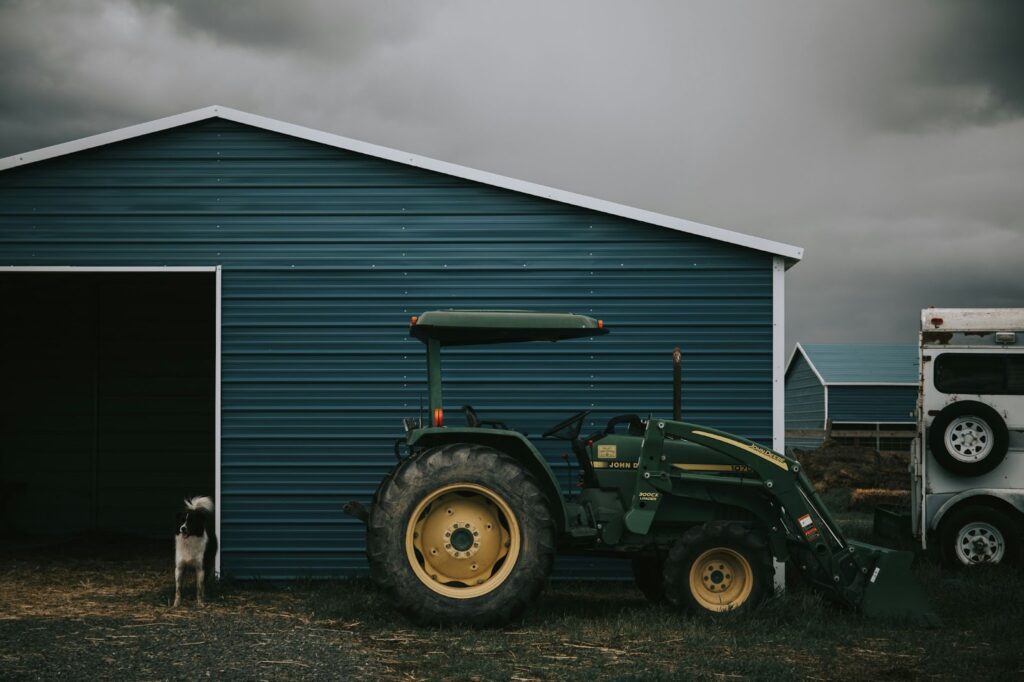
Pro tip:
One crucial tip for farm storage sheds is to prioritize proper ventilation. Good airflow is essential to prevent the buildup of moisture, which can lead to mold, mildew, and rust, potentially damaging stored equipment and commodities. Implementing features like ridge vents, louvered vents, or even powered exhaust fans can help maintain a dry and stable environment inside the shed. This not only protects your assets but also ensures a longer lifespan for the structure itself.
Maintenance Tips for Your Farm Equipment Storage Shed
A well-maintained storage shed ensures that your equipment remains in excellent condition for years to come.
When it comes to maintaining your farm equipment storage shed, there are several key factors to consider beyond just regular cleaning and inspection.
Ensuring the longevity of your shed and the equipment within it involves a comprehensive approach that addresses various aspects of maintenance.
Regular Cleaning and Inspection
Make it a habit to regularly clean your storage shed. Remove any debris or dirt that may accumulate inside or around the shed, as they can lead to rust or damage over time.
Additionally, conduct routine inspections for any signs of wear or structural issues that may need repair.
Pest-Control Measures
Pests can wreak havoc on your equipment and shed. Implement pest control measures such as sealing any gaps or cracks that may act as entry points for rodents, insects, or birds.
Use appropriate pest-control products to safeguard your equipment from potential damage.
Weatherproofing Techniques
To further protect your equipment from the elements, consider weatherproofing your storage shed. Apply weather-resistant coatings to the shed’s exterior to prevent water damage.
Insulate the shed to regulate temperature and reduce condensation. Properly seal doors and windows to prevent water and moisture from seeping in.
By following these maintenance tips, you can ensure that your farm equipment storage shed remains in optimal condition, protecting your valuable investments for years to come.
Remember, investing time and effort into the maintenance of your storage shed now can save you significant costs and headaches down the line.
By staying proactive and addressing any issues promptly, you can prolong the life of both your shed and the equipment stored within it.
Additionally, consider organizing your equipment within the shed for easier access and to prevent clutter, which can contribute to a more efficient and safe working environment.
Conclusion
A farm equipment storage shed is an indispensable asset for any farmer. Not only does it protect your equipment from the elements, but it also enhances operational efficiency and ensures the longevity of your tools and machinery.
By carefully considering the type of shed, key features, and maintenance tips, you can make an informed decision and enjoy the benefits of a well-organized and secure storage solution.
SteelCo has more than 23 years of experience dropshipping customizable steel building kits for storage sheds nationwide.
Our team of experts, with 100+ years combined experience, can provide specialized assistance in helping clients with the initial basic concept/design, navigating construction timelines, and providing stamped engineering plans to simplify the process of obtaining necessary building permits and licenses.
Learn more about our industry expertise in farm storage sheds or steel agricultural buildings.
—————————–
Frequently Asked Questions
What’s the recommended size of a farm equipment storage shed?
For large-scale farm equipment storage, the ideal shed dimensions generally include a width of 60 to 80 feet, a length of 120 to 160 feet, and a door height of around 18 to 20 feet for sufficient interior clearance.
These sizes are recommended to accommodate a variety of large machinery and allow for efficient movement and organization within the shed, ensuring that it meets both current and future storage needs. It’s crucial to tailor these dimensions based on the specific types of equipment and any anticipated future purchases.
What materials should I use?
Common options include steel, wood, or a combination. Each material has pros and cons regarding cost, durability, maintenance, and aesthetics. Steel and aluminum are sustainable choices that provide durability and resistance to weather. They are increasingly used in farm construction for their longevity
Do I need a permit for farm equipment storage shed?
Whether you need a permit to build a farm equipment storage shed can depend on several factors, including the size of the shed, local zoning laws, and the intended use of the shed.
Generally, smaller sheds may not require a permit, but larger structures often do. In some regions, almost every farm shed or building requires a permit, and it must be approved before any construction begins. It’s important to check with your local building authority as requirements can vary.
Should I insulate the shed?
Insulating your shed can provide a barrier against extreme temperatures and humidity, which is especially important if you reside in an area with harsh weather conditions. Proper insulation can help to protect any equipment or items stored in the shed from potential damage caused by these environmental factors.
What kind of doors should I have?
When choosing doors for a farm equipment storage shed, it’s important to consider large sliding doors for their wide openings and space efficiency, overhead doors that roll up to save space, hydraulic doors for easy access with large machinery, or bi-fold doors that fold upwards, conserving headroom and space in front of the shed.
These door types are designed to accommodate the size and frequency of equipment movement and take into account local weather conditions while ensuring safe, non-slip entry points for machinery.
What are the costs involved?
The cost of constructing a farm equipment storage shed can range significantly, with large sheds (around 2,000 SF) starting at $34,000 and going up to $40,000 or more.
The final price will depend on the chosen materials, size, design complexity, and any additional features. For an accurate estimate, it’s best to consult with a builder or supplier who can provide a quote tailored to your specific design and location requirements.
————————————-
Check out these related articles:
> How To Build A Self-Storage Facility
> RV Storage Building Solutions: Maximizing Space and Security







